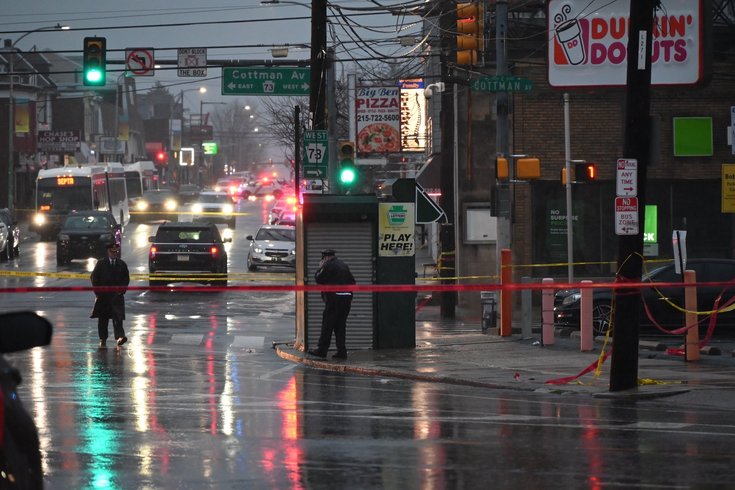
June 25, 2024
 Kyle Mazza/SOPA Images; Sipa USA
Kyle Mazza/SOPA Images; Sipa USA
U.S. Surgeon General Vivek H. Murthy declared gun violence to be a public health emergency. In March, eight students at Northeast Philadelphia High School were injured during a mass shooting at a SEPTA bus stop in Burholme; the crime scene is pictured above.
U.S. Surgeon General Vivek H. Murthy on Tuesday declared gun violence to be a public health emergency. Philadelphia Mayor Cherelle Parker supported the decision, and a local health advocate hopes it will lead to more resources for programs that work with child victims of firearm-related violence.
Gun-related deaths reached a near three-decade high in the United States in 2021, driven in particular by gun-related homicides over the past 10 years and gun-related suicides over the past 20 years, according to the nearly 40-page advisory. The declaration was spurred by the physical and mental health impacts of gun violence and the increasing number of children and adolescents dying from gun-related injuries.
Murthy is urging health experts, policy makers and community members to take a "public health approach" to developing strategies to stem gun violence in the same way national efforts have succeeded at addressing tobacco-related illness and motor vehicle crashes.
Philadelphia has seen historically high levels of gun violence over the past several years. As of June 23, there has been 407 nonfatal and 110 fatal shooting victims in 2024, according to the city controller's office.
Raquel Richardson is a social worker with the Violence Intervention Program at the Children's Hospital of Philadelphia that provides trauma-informed advocacy and case management for youth (ages 8 to 18) who have been victims of gun violence or other types of assault.
Some of the youth she works with view their situation as, "I got shot, unfortunately, but I lived, whereas I have a friend who got shot who didn't live," Richardson said. "This is becoming normal to them, in a sense. People are getting shot in Philadelphia every day. ... But this is not normal. To normalize being shot at the age of 9 — just getting off the school bus or hanging out in a park — is really sad.
"I'm just hoping that this announcement will open up more resources for the city, for not just the kids, but also for the parents and then for the people who help the families," Richardson said.
Parker declared a public safety emergency on her first day in office to push resources into neighborhoods riddled with gun violence and open-air drug dealing. Last week, she signed a bill into law that bans the possession, production, purchase, sale or transfer of rate-of-fire acceleration devices on guns, also known as gun switches.
In March, eight students were injured when three people opened fire at a SEPTA bus stop in Burholme. At least one of the shooters had converted a pistol into a fully automatic machine gun using a switch device.
On Saturday, a Philadelphia police officer was shot and injured during a traffic stop in Kensington, at least the eighth office to be shot since October. That same month, officer Richard Mendez died after being shot while investigating a suspected car break-in at Philadelphia International Airport.
"The designation of gun violence as a public health crisis could open the door to innovative solutions, greater resources, and a more holistic approach to preventing firearm-related injuries and deaths," Parker's administration said in a statement. "By treating gun violence as the public health issue it truly is, we can foster safer communities and protect the well-being of our communities."
Murthy's report pointed to "increasing evidence that exposure to firearm violence can contribute to elevated stress levels and mental health challenges and threaten the sense of well‑being for entire communities."
Since 2020, firearm‑related injury has been the leading cause of death for U.S. children and adolescents ages 1-19, surpassing motor vehicle crashes, cancer, drug overdose and poisoning. In 2022, 48,204 people died from firearm‑related injuries — over 8,000 more lives lost than in 2019 and over 16,000 more than in 2010, according to Murthy's advisory.
Mass shooting deaths, which represent about 1% of all firearm‑related deaths in the United States, are also increasing.
"Despite accounting for a relatively small number of firearm deaths, mass shooting incidents cause outsized collective trauma on society and have a strong negative effect on the public’s perception of safety," Murthy's report said.
More than 600 mass shooting incidents occurred each year between 2020 and 2023, compared with an average of less than 400 per year between 2015 and 2018, according to data included in the report from the Gun Violence Archive.
"A lot of kids just want to play outside," Richardson said. "Summertime is here. We just want the kids to be safe, physically, mentally. ... They want to go to school, come to and from school safely. That's it. That's all they want to do. Their goal is to just make it to age 18, and that's just so hard to hear a kid say, 'I just want to live.'"
To combat gun violence, the advisory outlines several steps including improving data sources and data collection to inform prevention activities, expanding research to examine short‑term and long‑term outcomes of firearm violence and evaluate specific prevention strategies, and implementing community violence interventions to support populations with increased risk of firearm violence involvement.
Other prevention strategies the report recommends to public health experts and policymakers include requiring safe and secure firearm storage, including child access prevention laws, implementing universal background checks and expanding purchaser licensing laws, and banning assault weapons and large‑capacity magazines for civilian use.